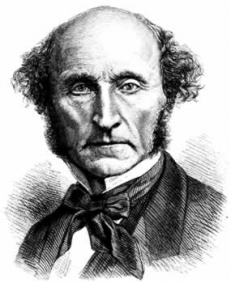
Email: ZYVC057@live.rhul.ac.uk
Total Article : 213
About Me:I'm a graduate student studying International Criminal Law and first started writing for King's News almost 4 years ago! My hobbies include reading, travelling and charity work. I cover many categories but my favourite articles to write are about mysteries of the ancient world, interesting places to visit, the Italian language and animals!

John Stuart Mill is more of a domestic political scholar, yet there are international issues which come out of Mill.
Adam Smith sustains that colonialism is a bad idea as it dampens economic growth and world trade, the invisible hand must be left alone. Mill adopts a similar view to Smith in regards to non-intervention by the state yet he is for colonialism. Born in the 19th century he had a hard upbringing as his father and god father were philosophers and intended on bringing Mill up as such. He worked in East-Indian company like his father, was an MP and philosopher - his most important work being ‘On Liberty’. He was a radical liberal and great advocate of women’s rights. Liberty for Mill is the driver of progress; he is not interested in economic growth but moral and intellectual progress. In ‘On Liberty’ he establishes how people best progress and it is through freedom; freedom of the creative and if necessary the eccentric. He wants government to be fairly small not intervening in public life, he considers norms to be stifle and the individual should do as he/she pleases. He finds customs abominale and as such they should be constantly challenged as the lack of eccentricity of his time is reflective of lack of progress. By trying new ideas one discovers new things. He sees the state as what stifles people, the idea of having docile subjects which never question the law means that no great thinker will come out of it.
COLONIALISM
When it comes to colonialism Mill argues in favour of it. He qualifies his argument by stating that it only applies to highly educated. History is therefore divided in stages:
- Savagery: man in isolation. Men do not have the capacity to self-govern because of their excessive love of freedom. Slaves on the other hand may be schooled in obedience that their capacity for rationality is stifled.
- Slavery: men need to be forced to work; a despotic government is appropriate at this stage).
- Middle stages: not a clear stage according to Mill.
- Modern civilisation: formed of a representative government; both mental and moral developments allow us to an extent to choose government and we have the ability to create the imaginative, live in eccentric ways and power to develop new ideas. Only this stage produces the material and cultural conditions that enable civilians to realise their potential for freedom and self-government.
This last stage only really exists in Britain. Great Britain is acting in the interest of less developed nations by governing them. 'Barbarians' will not develop alone; Mill's idea of the world is hierarchical as Britain is the leading force which aids development in barbaric countries. Hence running India becomes a moral enterprise, he calls it 'despotic control'. Mill doesn’t think that progress is inevitable, progress may not happen so by allowing barbarians to run their state there may be regression instead of growth. Colonial rule can carry the people ‘rapidly through several stages of progress..’. From this point of view imperialism is not primarily a form of political domination and economic exploitation but rather a paternalistic practice of government that exports ‘civilisation’ in order to foster the improvement of native people. Despotic government (and Mill doesn’t hesitate to use this term) is a means to the end of improvement and ultimately self-government. Freedom is about being able to do things one choses without causing harm. Eisein Berlin concocts the idea of two types of liberty; in the history of philosophy we have:
Negative liberty: freedom from interference (Smith and Mill, freedom from coercion);
Positive liberty: freedom to do/achieve things, self-realisation.
Both Mill and Smith believe in a small state which doesn’t intervene yet when it comes to colonialism Mill doesn’t carry out this idea as it is our duty to guide other states to development.
Mill, a life-long employee of the British East India Company, recognised that despotic government by a foreign people could lead to injustice and economic exploitation. If these abuses were to be unchecked they could undermine his entire argument for colonialism. In ‘Considerations on Representative Government’ (1861), Mill identifies four reasons why foreign people are not suited to governing colonies.
- They are unlikely to have knowledge of the local conditions necessary to solve public problems effectively
- Cultural, linguistic and religious differences may lead colonisers to sympathise more with those closer to their kind and act tyrannically
- Even if they do try to sympathise their natural tendency would be to get closer to those similar to themselves (merchants, other foreign colonists)
- Merchants and colonists go abroad to gain easy wealth, their economic activity will often exploit the colonised country rather than develop it. These arguments echo points made in Edmund Burke’s writings on the misgovernment in India, most notably his famous speech on Fox East India Bill (1783).
For Mill parliamentary oversight was no solution as it would politicise decisions, making imperial policies a result of party struggles not technocratic expertise. It would also be aimed at maximising Britain’s self-interest. Mill’s solution was to eschew parliamentary oversight in favour of specialised administrative corps. Members of this body would have specialised training about local customs. They would be paid by government but would not personally benefit from economic exploitation, being able to mingle with colonialists and indigenous people. Mill was not however able to explain how to ensure good government where those wielding political power were not accountable to the population.
Image: http://www.utilitarian.net/jsmill.jpg

0 Comment:
Be the first one to comment on this article.